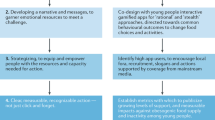Abstract
Empirical research with young people in Finland, Germany, Spain and Britain was carried out as part of the BIOCULT project funded by the European Union. The project focused on their attitudes to biotechnology and, in particular, the formation of arguments about risk and safety. This paper looks at the responses of 14–18 year olds to a story about the so called anti-obesity gene, in the form of advice to a friend who is taking it. The majority advised against taking it with some differences by gender and country. Most reservations were on grounds of safety and the feeling that ‘natural’ ways to lose weight are better: A minority questioned the idea of striving for a ‘perfect’ body. The types of arguments used by the young people reveal underlying perspectives on the place of human beings in the world and whether they have a right to manipulate nature and their own bodies.
Similar content being viewed by others
References and notes
Macer, D. (1990) Shaping Genes, Eubios Ethics Institute
Lyon, E. & Breakwell, G.M. (1994) Factors predicting environmental concern and indifference in 13–16 year olds. Environment and Behaviour 26 (2):223–238, p. 237.
Beck, U. (1992) Risk Society, Towards a new modernity, Sage Publications, London, p.21
ibid.,, p.22.
Lemkow, L. (1993) Public Attitudes to Genetic Engineering: Some European Perspectives, The European Foundation for the Improvement of Living and Working Conditions, Dublin, Ireland; Young, K. (1991) Shades of Green, in: Jowell, R., Brook, L. & Taylor, B. (eds.) British Social Attitudes 8th Report 1991/1992, Dartmouth Publishing, England; Witherspoon, S. (1994) The Greening of Britain: romance and rationality, in: Jowell, R., Curtice, J., Brook, L. & Ahrendt, D. (eds.) British Social Attitudes 11th Report, pp.107–138.
Mellor, M. (1992) Breaking the Boundaries, Towards a feminist green socialism, Virago Press, London, p.163.
Eurobarometer 35.1 (1991) Biotechnology, INRA for the Commission of the European Communities.
STOA (1992) Bioethics in Europe, Directorate General for Research, Luxembourg.
Lemkow (1993) op. cit., p. 22.
Bunton, R. & Burrows, S. (1995) Consumption and health in the ‘epidemiological’ clinic of late modern medicine, in: Bunton, R., Nettleton, S. & Burrows, R. (eds.) (1995) The sociology of health promotion, Routledge, London, chap. 16, p. 212.
Freund, P.S. & McGuire, M.B. (1991) Health, Illness and the Social Body, Prentice Hall, New Jersey, USA, p. 48.
Goffman, E. (1968) Stigma. Notes on the management of spoiled identity. Penguin, London; Scheff, T.J. (1966) Being mentally ill. A sociological theory, Aldine Publishing. New York, chap. 2.
These figures were based on the young person’s reporting of fathers’ occupation (see reference 9).
O’Brien M. (1995) Health and lifestyle. A critical mess? Notes on the dedifferentiation of health, in: Bunton, Nettleton and Burrows (1995) op. cit., chap. 15.
Foucault, M. (1990) The History of Sexuality, Vol. 1, Vintage Books, New York.
Author information
Authors and Affiliations
Additional information
Marie Levitt is a sociologist with research interests in attitudes and values in relation to biotechnology, health and religion.
Rights and permissions
About this article
Cite this article
Levitt, M. Natural ways are better: Adolescents and the ‘anti-obesity’ gene. SCI ENG ETHICS 3, 305–315 (1997). https://doi.org/10.1007/s11948-997-0037-z
Received:
Revised:
Accepted:
Issue Date:
DOI: https://doi.org/10.1007/s11948-997-0037-z



